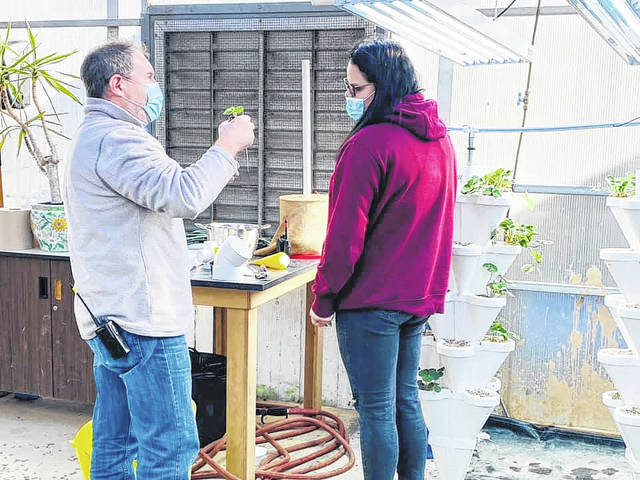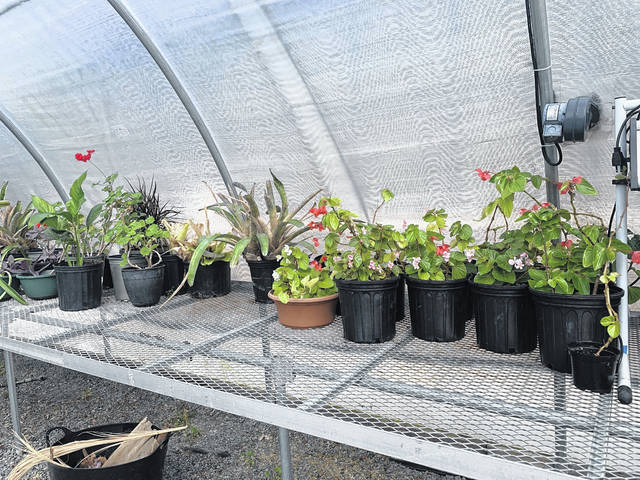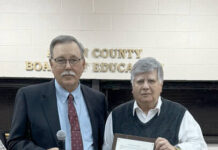
The greenhouse innovation center at Anson High School allows students to work with micro-greens, hydroponics and aquaponics systems.
Liz O’Connell | Anson Record
WADESBORO — After a high teacher turnover rate in the agriculture department at Anson High School, Dana Wood stepped up to revitalize the program at a national level.
Anson High School had gone through four teachers leading the agriculture department in the past five to six years. But when Wood stepped onto campus after teaching in three other states, he was determined to stay.
“I think the turnover just unfortunately makes it difficult to grow a program,” Wood said. “It’s like anything else, you work to build a rapport with students and they start to talk positively about the program. The next year they start inviting their friends and the program starts growing that way.”
The program has grown from about 60 to 130 students since Wood started in March of 2017. This has allowed the high school to hire an additional agriculture teacher, Emilie Fowler, which Wood believes marks the first time the program has ever had a second teacher.
Fowler graduated from Anson Early College in 2018, followed by graduating from Brevard College with a Bachelor’s in Agricultural Education. Soon after graduation, she received a phone call with a job offer to come back to Anson High School.
“I think it is important that my generation, as well as the future generations and the ones below me know where their meats are coming from, where their vegetables are coming from,” Fowler said. “The (agriculture) industry, in my eyes, is the back bone of everything because you get all the food, fiber, natural resources.”
Fowler wants her students to understand the production behind going to the grocery store and seeing produce on the shelves. The whole industry is much more than that.
Although Anson is a largely rural county, most of the students that go through the high school’s agriculture program do not have a background in farming. According to the U.S. Department of Agriculture, on-farm jobs accounted for only 1.3% of the United States employment in 2019. Wood said this national statistic still holds up in Anson County.
“If you took 100 of our students, to put it in perspective…line them up shoulder to should along the sidewalk you walk on, if I ask the percentage of students that represent the percentage of today’s farmers that are growing a crop or raising hogs or livestock in any way, shape or form, to step forward, only two of those 100 students are going to step forward,” Wood said. “Honestly it is not even two, it is like 1.6% of our population…so 1.6 people out of 100 in the U.S. is responsible for putting everything you see in Walmart or Food Lion or IGA.”
Even though the percentage involved with agriculture is so low, Wood believes it is critical for students to still learn about the industry. Without agriculture, people would not have clothes, food and housing.
The students’ first class in the agriculture program is an introduction class. This class touches on animals, plants, natural resources and Future Farmers of America (FFA). From there, students choice a pathway to study further — horticulture, animal science or sustainable agriculture production.
Wood explained how students are encouraged to stick with a specific pathway. For example, students who complete sustainable agriculture production one and two will be considered a leader in that area.
“The goal really is for them to choice plant or animal science or sustainable and by the time they are a senior…actually have them out and about in basically a placement or entrepreneurial (supervised agricultural experience) project,” Wood said. “With that in mind, SAE involvement allows students as a senior later on, junior or senior, to apply for proficiency awards…It is possible to get scholarships if you have a really good and involved SAE project.”
Every student in this program becomes a Future Farmers of America member. Membership dues are paid by the Anson County Farm Bureau, allowing every student to become part of FFA regardless if they can afford it or not. FFA gives students the opportunity to learn leadership or communication skills, practice those skills and even travel to different conventions at the state and national level.
In a normal, non-COVID school year, students at Anson High travel in the spring to regional events to compete in welding, forestry or poultry production. During the state convention in June, students meet with state senators and tour the state’s government buildings.
In October, a group of students are invited to go to the national convention in Indianapolis, Indiana. These Anson students join 70,000 other FFA members, advisors and guests from across the nation. The national convention hosts a career showcase, colleges or trade schools to recruit high schoolers, leadership workshops, a rodeo and award ceremonies.
“It gives the students an opportunity, some of which have never been out of this county or out of the state of North Carolina with their family,” Wood said. “They’re now traveling via carter bus with five other (FFA) chapters in North Carolina to Indianapolis.”
Two years ago, three students even had the chance to travel to Washington D.C. for a leadership conference, which is the “pinnacle leadership opportunity that is provided by the National FFA.”
Wood is building more than just an agriculture program. He is offering students lifetime opportunities and environments to link what you learn in the class to real life situations.
The experiences at Anson High School are not only unique to the area, but throughout the country. There only a few schools throughout the nation with greenhouse innovation center, according to Wood. This greenhouse learning hub on Anson’s campus introduces students to micro-greens, hydroponics and aquaponics systems.
“They’re paying attention to what we’re doing,” Wood said. “Other programs are still maybe focused on production agriculture, the cows, plows, the livestock. We’re expanding beyond that.”
Wood wanted to transition the greenhouse, that was already part of the program, into something that could be used nine months out of the year. Classes started producing lettuce in the greenhouse innovation center. When running well, it can produce 2,100 heads of lettuce in a year, according to Wood. Local restaurants like Oliver’s and Allen’s now purchase lettuce and chives from Wood and the agriculture program.
Soon there will be a freshwater marine biology system added into the classroom with tanks of breeding seahorses, coral and anemones. Then a little more down the line, Wood plans on introducing drones to the program as drones are being used by farmers to scout the crops.
“We’ll probably be the only high school in the state of North Carolina that has not only has aquaponics, aquaculture and freshwater lab, which will produce tropical fish in,” Wood said. “Once they start producing fish, we have two elementary schools that want our students to come in and set up freshwater systems in their schools. Our students will then go over there and teach freshwater biology to elementary kids.”
Anyone with history on the Anson Future Farmers of America (FFA) Chapter is asked to provide more info. Wood is interested in learning more about the history of the program, especially since he is not from the county.
Reach Liz O’Connell at 704-994-5471 or at eoconnell@ansonrecord.com.






